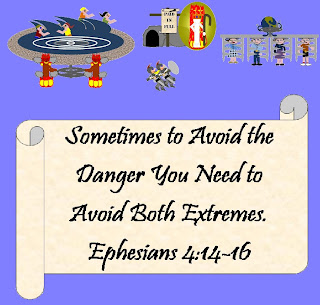Ulysses, on his journey home in the Odyssey, is forced to pass between two monsters, Scylla and Charybdis. They were on opposite sides of a narrow ocean channel, and to avoid one put you in danger of falling into the clutches of the other. I believe that our culture is in the grip of two monsters.
On the one side we have increasing conformity and depersonalization, and on the other increasing individualism and license.
We are in danger of being seen as interchangeable cogs in a vast machine, pressed into shape to fit in with everyone else. We are seen as a something like play-doh, which can be molded into any shape and will take up every picture it is pressed on. This comes partly from a distorted view of equality. All people are valuable in God's sight, being made in His image (Genesis 1:26; 9:6; James 3:9). But this can be taken to mean we are indistinguishable and must all act alike.
On the other extreme there is total individualism. This sees us as completely independent and left unrestrained to follow every impulse. The problem with that is, we are sinners and there are impulses in us that are best not followed (Romans 7:14; Jeremiah 17:9; Isaiah 64:6). But there is the idea that restraint is an offense against the inner self, which is assumed to be good. And both of these ideas feed on each other, so that as people in our society begin to feel more and more like counters, they react by going to extremes to express their individuality.
I am convinced the only real answer is God's grace. We are told there is a real standard of right and wrong that transcends both the individual and society (Romans 7:12; 3:31; Matthew 5:18). But we cannot keep this standard, and God has offered us forgiveness in Jesus Christ (Ephesians 1:7; Colossians 2:13,14; Romans 8:3,4) if we put our faith in Him (Romans 4:4,5; Ephesians 2:8,9; Philippians 3:9). Then having forgiven us, He begins to work in us to transform us (2 Corinthians 3:18; Titus 2:11-14; Ephesians 2:10). He also makes us part of a body, which is built on unity in diversity (1Corinthians 12:12-27; Romans 12:3-8; Ephesians 4:11-16). This allows me over time to be transformed, though often haltingly and imperfectly, into the person God really wants me to be. Which is the result of the grace and love of God that motivates me to love Him in return (1 John 4:19; 2 Corinthians 5:14,15; Romans 5:1,2). And I can grant grace to and receive grace from other Christians, knowing that we are all different and fall short of perfection (1 Peter 4:8; James 4:11,12; Hebrews 12:12,13). And having received it ourselves, we can offer it to those outside. For we are on a journey to Someone who is higher than self and society, and we have us not yet arrived (Philippians 3:12-16; Hebrews 12:1,2; 1 Timothy 4:7,8).
Spurgeon on Active Obedience
1 hour ago




No comments:
Post a Comment